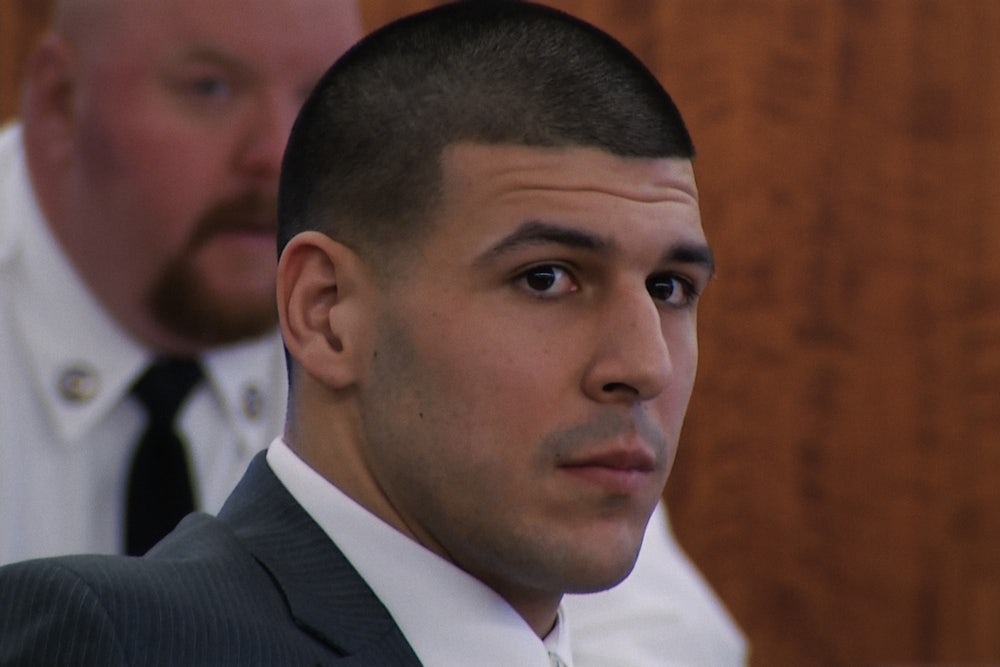The story of Aaron Hernandez—money, fame, sex, murder—is sensational. Thus it should not surprise that the new documentary Killer Inside: The Mind of Aaron Hernandez, which seeks to explain why this wildly successful athlete would kill a man in cold blood, is lurid. It’s difficult to understand our seemingly bottomless appetite for true crime as anything but schadenfreude. Our impulse to rubberneck may be less unsavory than the crimes themselves, but it still makes me feel dirty. Perhaps that is the point, or part of the pleasure.
Hernandez was raised in the well-enough-to-do Connecticut suburbs. He had a tumultuous upbringing, suffering what could fairly be called abuse at the hands of his demanding, football-obsessed father. But he had a gift, and the discipline to hone his body into a machine. Sports are games, but like virtually everything else in this culture, they’ve been transformed by capital into something deeply unfun. Hernandez left high school early to attend the University of Florida, where football is both religion and an industry. He then left college his junior year and, in the fourth round of the 2010 NFL draft, was tapped to join the New England Patriots.
Killer, directed by Geno McDermott, assumes a decidedly convoluted form, perhaps because it ought to be a conventional documentary film rather than doled out to us in a “limited” series format (it’s three episodes). The work is distributed by Netflix, and there’s probably some in-house research showing that people want to watch things unfold in installments. But Killer feels padded and repetitive, overlong and confusingly told.
The first two episodes seemed designed to crescendo on certain details—Hernandez had male lovers! Hernandez allegedly shot and killed two men, then went on to play a full season of football!—but the circumstances of the case are well-enough known (and so recent) that even I, the least-informed person in America on the subject of sports, remembered them.
Hernandez’s story is rich material, but the film isn’t sure what to make of it. Despite the tragedies of his youth (his father died during a routine surgery, his mother was having an extramarital affair with the husband of a beloved family member), Hernandez attained salvation, which is to say a professional football contract worth $40 million. To watch him squander it for a life of playing gangster—smoking pot, buying guns, getting hideous tattoos, rubbing elbows with criminals—is depressing. But is it anything more than that?
The film wants us to believe this is all a consequence of the fact that Hernandez led a “double life.” To that end, it trots out Dennis Sansoucie, a high school acquaintance who says the two were lovers when they were boys. I don’t doubt the veracity of his account, and I think many people feign ignorance of the sorts of things high school dudes get up to. But this doesn’t prove anything about Hernandez’s sexual identity (there are straight men who have or have had sex with men) and isn’t nearly as illuminating as the film thinks it is. Hernandez’s sole conviction was for the murder of a friend, Odin Lloyd. Was the motive to prevent Lloyd from saying something about Hernandez’s sexual identity? There’s as much evidence that it was to prevent Lloyd from implicating him in the Kennedy assassination. It’s utterly made up, and it’s irresponsible that Killer floats the possibility.
The show is built around recordings of prison telephone calls between Hernandez and his partner, Shayanna Jenkins, and their daughter, as well as his agent and his mother. These are awful to listen to, mostly because we shouldn’t be listening to them. Even if Hernandez didn’t have a legal expectation of privacy, what’s gained by hearing him coo at his baby daughter? If we need this to see Hernandez as human, we’re the ones with the problem. Listening to his mother berate him for not giving her a million dollars made me want to cry.
All it takes to be a talking head is a willingness to show up when the camera rolls. If we’re going to use podcasts and prestige-ish documentaries to draft history, we should remember that we’re hearing the facts from the people most willing to raise their hands. In this case, they include some of Hernandez’s childhood friends, other football players, and a Boston Globe reporter who marvels that Hernandez’s trial was a media circus, perhaps forgetting that she herself works in the media.
Hernandez made terrible choices. Maybe those were due to turmoil over his identity or trauma during his childhood. We can obviously never know (Hernandez died by suicide in 2017), and even if we did, it still would not suffice as an excuse. We can know—because an autopsy showed us—that he was suffering from chronic traumatic encephalopathy, the degenerative neurological condition the NFL doesn’t want you to think is the logical consequence of playing football.
One of the more nauseating moments of Killer is when Robert Kraft, the owner of the Patriots, shows up at Hernandez’s trial. The film calls our attention to the plaintiff nervously watching the door, as though waiting for Dad to come home. More damning, I thought, is Kraft’s smug answer to the lawyer’s inquiry as to what he does for a living. “Whatever they tell me to,” he jokes, not man enough to say he’s a billionaire, a clever boy who’s bought himself a toy, an NFL team, that makes him still more money.
Money, it often feels to me, is the subtext of every American story. Overlaying the broadcast of Hernandez as a college player is an ad for Nissan. Only that word: Nissan, its message subliminal. For his crimes, Hernandez went to prison, where he lost his life. The billionaires who pay men millions to damage their brains for television audiences? They’re the ones getting away with murder.
